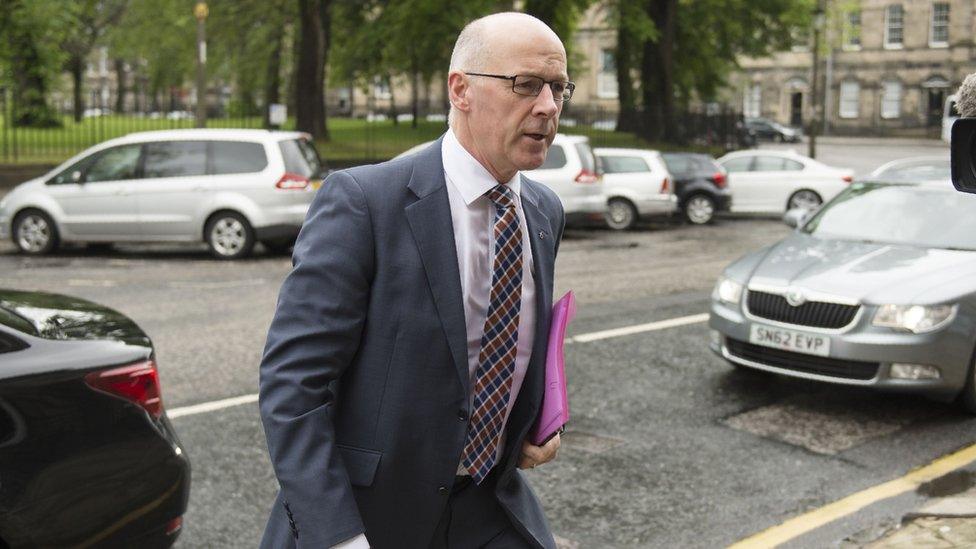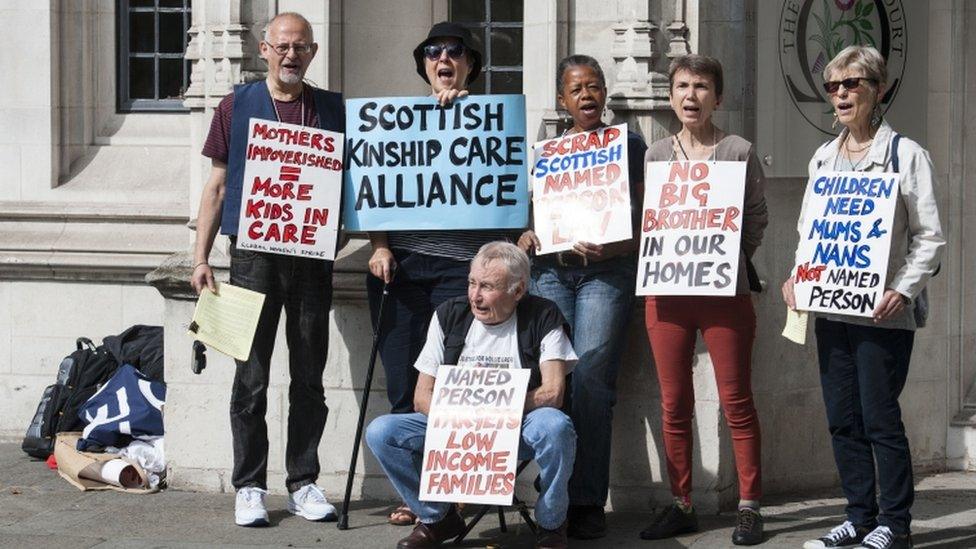Talks over changes to named person scheme after court defeat
- Published

John Swinney has held talks with senior figures from councils, police and the NHS following the ruling
The Scottish government has opened talks with public sector leaders and charities to amend its named person scheme, after its existing legislation was ruled unlawful.
The Supreme Court found that parts of the legislation relating to information sharing breached human rights rules.
Education Secretary John Swinney said the policy will still be implemented once changes have been made.
Opponents of the scheme have called for a complete re-think of the plans.
A panel of five judges at the Supreme Court upheld a legal challenge to the legislation, part of the Children and Young People (Scotland) Act 2014, from the No to Named Persons campaign group.
They argue that the system, which would provide a named person for every child in Scotland, usually a teacher or health visitor, intrudes on privacy and family life.
The court ruled, external that while the aim of the scheme was "unquestionably legitimate and benign", the data-sharing practices currently legislated for made it "perfectly possible" for confidential information about a young person to be shared with "a wide range of public authorities without either the child or her parents being aware".
Judges said this is "incompatible with the rights of children, young persons and parents" under Article 8 of the European Convention on Human Rights.
Lord Hodge delivered the Supreme Court ruling against the system
The scheme was meant to be rolled out across Scotland on 31 August, but the Scottish government is "urgently" drafting an order to cancel this, to provide time for changes to be made to the legislation after Holyrood returns from recess in September.
The Lib Dems had called for parliament to be recalled over the matter, but this was rejected by Presiding Officer Ken Macintosh, who said the most pressing matter - the government's order postponing the implementation of the policy - did not need parliament to be sitting.
Mr Swinney said he had already held talks with "senior figures from the public and third sectors", including the NHS, councils and Police Scotland.
The Deputy First Minister said: "Our aim has always been for the named person to provide timely support for children and families. We have always said that as part of that role, we expect that any sharing of personal information should be proportionate and relevant.
"The Supreme Court's ruling makes clear that while the principle of providing a named person for each child does not breach human rights, we need to do further work to ensure those performing the role have greater clarity about sharing information, as required by the court."

Campaigners opposed to the scheme gathered at the Supreme Court for the verdict
A number of Scottish councils are currently running pilot versions of the Named Person scheme.
Opponents have claimed this could leave these councils open to legal challenges from parents about the data-sharing practices used, but Mr Swinney insisted in a letter, external to Holyrood's education committee that existing procedures are not affected by the ruling.
'Utterly negligent'
The No to Named Persons group said the government would now have to come up with a "much more limited scheme" which "actually respects the rights of children and parents".
And spokesman Simon Calvert said he hoped the system was scrapped entirely.
He said: "The decision by the judges is a devastating critique of this fatally flawed flagship legislation. It is holed below the water line - let us hope it sinks without trace."

Campaigners fear the scheme will cause unnecessary intrusion into family life
Scottish Conservative leader Ruth Davidson said the government needed to "go right back to the starting block" with the legislation, saying they had "lost the support of the majority of parents across Scotland".
She said the government would "face a heavy reckoning from Scottish parents who rightly want to be able to raise their children without state interference" if it went ahead with the plans as they stand.
And Tory education spokeswoman Liz Smith said it was clear that the scheme was "unworkable and unnecessary".
She said: "The Supreme Court has blown the named persons scheme out of the water and it's time that the SNP realised that it's time to stop pursuing it.
"Instead of arrogantly trying to push ahead, they should listen to the many voices who are saying that this policy is unworkable and unnecessary. Nicola Sturgeon needs to accept that she got this one wrong, and that it's time to put the best interests of families in Scotland before her own narrow-minded political agenda."
Labour's education spokesman Iain Gray said the SNP had "made an absolute mess" of the named person scheme.
He said: "John Swinney can't pretend there's no real problem here. Fixing this will take more than just amending the legislation. He must completely re-examine the guidance and regulations."
- Published28 July 2016

- Published28 July 2016
